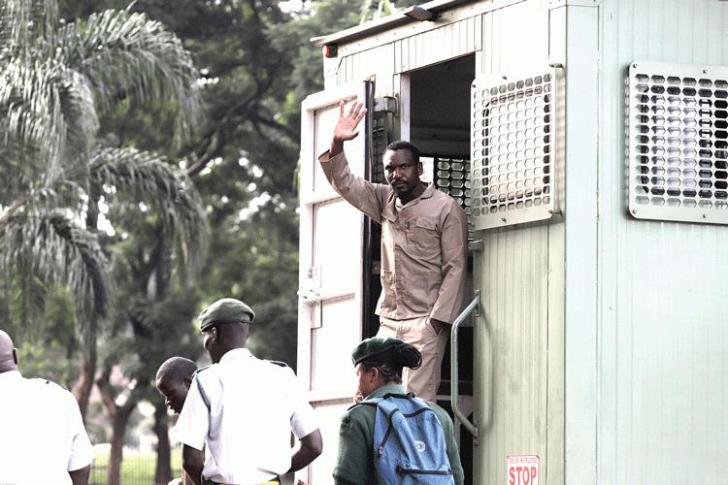News / National
Blessed Mhlanga robbed 73 days of his life
08 May 2025 at 08:54hrs |
0 Views

Alpha Media journalist Blessed Mhlanga was finally granted freedom on Wednesday night after spending 73 days in pre-trial detention at Harare Central Remand Prison. Mhlanga was arrested in early January on charges of transmitting data that allegedly incited violence following the broadcast of a press conference held by war veteran Blessed Geza, who had challenged President Emmerson Mnangagwa.
Mhlanga, who had made three failed attempts to secure bail, was granted release on Tuesday afternoon by High Court Judge Justice Gibson Mandaza. However, an administrative error in his bail paperwork led to a delay, and he was only released the following night.
As he walked out of the prison gates, Mhlanga expressed both relief and sorrow, reflecting on his harrowing ordeal. "I was not supposed to be here in the first place - it is general knowledge. After 72 days of having my freedom robbed, I am indifferent. I think you have heard this over and over again. Describing the conditions I endured in words is really impossible," he said, his voice breaking with emotion.
Mhlanga described the prison conditions as "hell", but acknowledged that the prison officers did their best to maintain order despite limited resources. He also noted his ongoing health concerns, mentioning the need to consult with his doctors after being unwell during his time in detention.
Mhlanga's arrest came amid ZANU-PF's factional battles, in which Geza, a prominent war veteran, publicly criticized Mnangagwa's leadership. While in detention, Mhlanga faced further setbacks, including being denied the opportunity to sit for his university exams.
Despite his difficult and prolonged detention, Mhlanga remained defiant. "I have been made aware of a statement suggesting that the reason I am out is because there is justice in this country. I am worried about that statement," he said, expressing concern over the broader implications of his case.
He continued, emphasizing the legal framework surrounding his detention: "Section 277 of the Criminal Law (Codification and Reform) Act is clear on how people who work for an organization, if it is being charged, must be treated. It establishes how to charge corporates or juridical persons," Mhlanga explained, hinting at possible legal complexities surrounding his case.
Mhlanga's release is seen as a moment of triumph, yet he remains critical of the legal processes he believes were mishandled during his detention. His case has sparked widespread discussions on freedom of the press, the rule of law, and the treatment of journalists in Zimbabwe.
Mhlanga, who had made three failed attempts to secure bail, was granted release on Tuesday afternoon by High Court Judge Justice Gibson Mandaza. However, an administrative error in his bail paperwork led to a delay, and he was only released the following night.
As he walked out of the prison gates, Mhlanga expressed both relief and sorrow, reflecting on his harrowing ordeal. "I was not supposed to be here in the first place - it is general knowledge. After 72 days of having my freedom robbed, I am indifferent. I think you have heard this over and over again. Describing the conditions I endured in words is really impossible," he said, his voice breaking with emotion.
Mhlanga described the prison conditions as "hell", but acknowledged that the prison officers did their best to maintain order despite limited resources. He also noted his ongoing health concerns, mentioning the need to consult with his doctors after being unwell during his time in detention.
Mhlanga's arrest came amid ZANU-PF's factional battles, in which Geza, a prominent war veteran, publicly criticized Mnangagwa's leadership. While in detention, Mhlanga faced further setbacks, including being denied the opportunity to sit for his university exams.
Despite his difficult and prolonged detention, Mhlanga remained defiant. "I have been made aware of a statement suggesting that the reason I am out is because there is justice in this country. I am worried about that statement," he said, expressing concern over the broader implications of his case.
He continued, emphasizing the legal framework surrounding his detention: "Section 277 of the Criminal Law (Codification and Reform) Act is clear on how people who work for an organization, if it is being charged, must be treated. It establishes how to charge corporates or juridical persons," Mhlanga explained, hinting at possible legal complexities surrounding his case.
Mhlanga's release is seen as a moment of triumph, yet he remains critical of the legal processes he believes were mishandled during his detention. His case has sparked widespread discussions on freedom of the press, the rule of law, and the treatment of journalists in Zimbabwe.
Source - NewZimbabwe
Join the discussion
Loading comments…

















